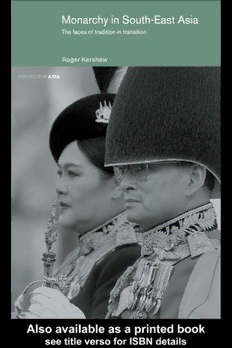Table Of ContentMonarchy in South-East Asia
Monarchy was the only type of polity in the South-East Asian region before the
rise of Western colonialism. And the impact of the distant past on contemporary
political values is felt even where monarchy was abolished by a colonial power.
This book surveys the historical contours of that monarchical tradition.
Roger Kershaw argues, however, that it was not ancient values which allowed
four monarchies to survive until now, but typically the interest of colonial powers
in stability. Even Thailand, for example, never colonized, can be analysed in
terms of an oblique ‘indirect rule’. More recently, Cambodia’s two Communist
regimes have seen the monarchy as a useful stabilizing factor. At the same time,
the Thai King’s authority reflects his personal longevity and merit; the
absolutism of the Sultan of Brunei rests on oil; only Malaysian monarchy is
purely ceremonial.
Designed as an introduction to the region’s monarchies, this book also
supplies a vital historical background, and political context, for five contempo-
rary case studies, and includes ample bibliographical reference, which will be
ideal for anyone interested in the dynamics of the South-East Asian region,
besides the idea of monarchy in our time. The more specialized reader will find
stimulating and original insights on the royal politics of Cambodia, Thailand,
Malaysia and Brunei over the past decade.
Roger Kershaw’s association with South-East Asia began in 1962, teaching in
Malaya. After graduate studies in London at SOAS, he became a lecturer in
South-East Asian Studies in two British universities – Hull and Kent – followed
by ten years in Brunei. He is now an independent writer and has written
extensively on South-East Asian societies.
Politics in Asia series
Edited by Michael Leifer
London School of Economics and Political Science
ASEAN and the Security of Politics in
South-East Asia Indonesia
Michael Leifer Democracy, Islam and
the Ideology of
China’s Policy Towards Tolerance
Territorial Disputes Douglas E. Ramage
The Case of the South
China Sea Islands Communitarian
Chi-kin Lo Ideology and
Democracy in
India and Southeast Singapore
Asia Beng-Huat Chua
Indian Perceptions and
Policies The Challenge of
Mohammed Ayoob Democracy in
Nepal
Gorbachev and Louise Brown
Southeast Asia
Leszek Buszynski Japan’s Asia Policy
Wolf Mendl
Indonesian Politics
under Suharto The International
Order, Development Politics of Asia-Pacific,
and Pressure for 1945–1995
Change Michael Yahuda
Michael R.J. Vatikiotis
Political Change in
The State and Southeast Asia
Ethnic Politics in Trimming the Banyan
Southeast Asia Tree
David Brown Michael R.J. Vatikiotis
The Politics of Hong Kong
Nation Building China’s Challenge
and Citizenship in Michael Yahuda
Singapore
Michael Hill and Lian Kwen Fee
Korea versus Korea Indonesia and
A Case of Contested China
Legitimacy The Politics of a
B.K. Gills Troubled Relationship
Rizal Sukma
Taiwan and
Chinese Arming the Two
Nationalism Koreas
National Identity and State, Capital and
Status in International Military Power
Society Taik-young Hamm
Christopher Hughes
Engaging China
Managing Political The Management of
Change in an Emerging Power
Singapore Edited by Alastair Iain
The Elected Presidency Johnston and Robert S.
Kevin Y.L. Tan and Lam Ross
Peng Er
Singapore’s Foreign
Islam in Malaysian Policy
Foreign Policy Coping with
Shanti Nair Vulnerability
Michael Leifer
Political Change in
Thailand Philippine Politics
Democracy and and Society in the
Participation Twentieth Century
Kevin Hewison Colonial Legacies,
Post-Colonial
The Politics of Trajectories
NGOs in South-East Eva-Lotta E. Hedman and
Asia John T. Sidel
Participation and
Protest in the Constructing a
Philippines Security
Gerard Clarke Community in
Southeast Asia
Malaysian Politics ASEAN and the
under Mahathir Problem of Regional
R.S. Milne and Diane K. Order
Mauzy Amitav Acharya
Monarchy in
South-East Asia
The faces of tradition in transition
Roger Kershaw
London and New York
First published 2001 by Routledge
11 New Fetter Lane, London EC4P 4EE
Simultaneously published in the USA and Canada
by Routledge
29 West 35th Street, New York, NY 10001
Routledge is an imprint of the Taylor & Francis Group
This edition published in the Taylor & Francis e-Library, 2001.
© 2001 Roger Kershaw
All rights reserved. No part of this book may be reprinted or
reproduced or utilized in any form or by any electronic,
mechanical, or other means, now known or hereafter
invented, including photocopying and recording, or in any
information storage or retrieval system, without permission in
writing from the publishers.
British Library Cataloguing in Publication Data
A catalogue record for this book is available from the British Library
Library of Congress Cataloging in Publication Data
Kershaw, Roger.
Monarchy in South-East Asia: the faces of tradition in transition /
Roger Kershaw.
p. cm. – (Politics in Asia)
Includes bibliographical references and index.
1. Asia, Southeastern–Politics and government. 2. Monarchy–Asia,
Southeastern–History. I. Title. II. Politics in Asia series.
DS526.6 .K48 2001
321'.6'0959–dc21 00-058260
ISBN 0–415–18531–9 (hbk)
ISBN 0–415–24348–3 (pbk)
ISBN 0-203-18784-9 Master e-book ISBN
ISBN 0-203-18907-8 (Glassbook Format)
This book is dedicated to my mother, born
Molly Brownlow, at Lambeth, 18 May 1906
Contents
Series editor’s preface xi
Preface xiii
List of abbreviations xv
A chronological key to principal events, 1840–2000, by country xvii
Map of South-East Asia xxiv
PART I
Opening thoughts 1
1 Introduction 3
PART II
Modern history 23
2 The colonial era: varieties of Indirect Rule 25
3 On the threshold of the present: post-war developments 37
4 Indonesia: the exception that proves the rule? 73
PART III
The latest phase 81
5 Laos: bowing off the stage of history 83
6 Cambodia: the King with nine lives 89
7 Malaysia: monarchy overawed 100
8 Brunei: perks and perils of absolute rule 118
9 Thailand: a King for all seasons 136

